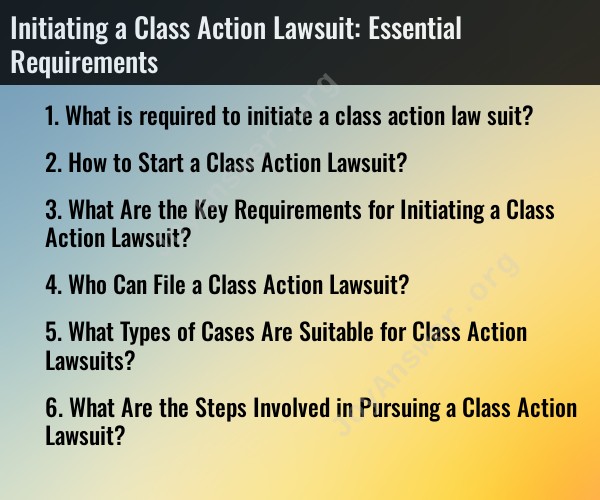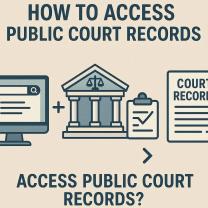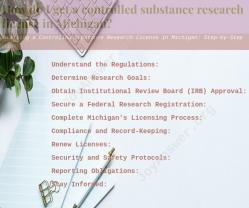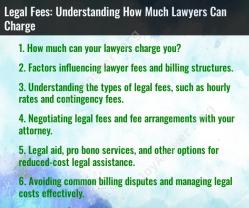What is required to initiate a class action law suit?
Initiating a class action lawsuit is a complex legal process that involves several essential requirements and steps. To successfully start a class action lawsuit, you typically need to meet the following key requirements:
Commonality: The potential class members must share common legal issues or questions of law and fact. In other words, the claims of the class members should arise from the same events, transactions, or circumstances. There must be a unifying element that binds the class together.
Numerosity: The class must be large enough to justify the use of a class action. While there is no specific minimum number required, there should be a sufficient number of potential class members to make individual lawsuits impractical. The exact number may vary based on the circumstances.
Adequacy of Representation: The proposed class representative, often referred to as the lead plaintiff, must adequately represent the interests of the class. This individual should have a strong interest in the case, and their claims must be typical of the class. The lead plaintiff should also have legal counsel who is experienced in class action litigation.
Typicality: The claims or defenses of the lead plaintiff should be typical of those of the class. In other words, the lead plaintiff's situation should closely resemble the circumstances of other class members.
Certification: The court must certify the class action. Certification involves a thorough review of the case to ensure that it meets the requirements for class action status. The court will assess whether the commonality, numerosity, adequacy of representation, and typicality criteria are met.
Notice: If the class action is certified, the court will order that notice be provided to potential class members, informing them of the lawsuit and their right to opt in or opt out of the class. This notice may be distributed through various means, such as mail, email, or publication.
Common Questions of Law and Fact: The class action lawsuit must involve questions of law or fact that are common to the class members. This means that the resolution of these common issues will impact all class members.
Predominance: A class action must be superior to other methods of resolving the legal issues. The court will consider whether common questions predominate over individual questions and whether a class action is a more efficient and fair way to handle the dispute.
Fair and Adequate Representation: The court must ensure that the interests of the class are adequately represented. The lead plaintiff and their legal counsel should be capable of representing the class effectively.
Legal Expertise: Given the complexity of class actions, it is advisable to have legal counsel with experience in class action litigation. An attorney or law firm with expertise in this area can help guide the case through the required legal processes.
Initiating a class action lawsuit is a significant legal undertaking, and it's important to consult with an attorney who specializes in class action litigation to determine if your case meets the necessary requirements and to navigate the legal process effectively. The requirements and procedures for class actions can vary by jurisdiction, so it's essential to be familiar with the specific rules and laws in your area.
How to Start a Class Action Lawsuit?
To start a class action lawsuit, you will need to contact an attorney who specializes in class action law. The attorney will assess your case and determine whether it has the potential to be a successful class action. If the attorney believes that your case has merit, they will help you to file a complaint with the court.
What Are the Key Requirements for Initiating a Class Action Lawsuit?
In order to initiate a class action lawsuit, the following requirements must be met:
- Numerosity: There must be a large number of class members who have suffered the same harm.
- Commonality: The class members must have a common claim against the defendant.
- Typicality: The plaintiff's claims must be typical of the claims of the other class members.
- Adequacy of representation: The plaintiff must be able to adequately represent the interests of the other class members.
Who Can File a Class Action Lawsuit?
Any person or entity that has suffered harm can file a class action lawsuit. However, the plaintiff must have a strong legal case against the defendant and must be able to adequately represent the interests of the other class members.
What Types of Cases Are Suitable for Class Action Lawsuits?
Class action lawsuits are often used to resolve cases involving:
- Consumer protection violations
- Securities fraud
- Product liability
- Employment discrimination
- Environmental damage
What Are the Steps Involved in Pursuing a Class Action Lawsuit?
The steps involved in pursuing a class action lawsuit include:
- Filing a complaint with the court
- Notifying potential class members of the lawsuit
- Obtaining class certification from the court
- Discovery
- Mediation or settlement negotiations
- Trial
- Judgment
Class action lawsuits can be complex and time-consuming. However, they can be a valuable tool for holding corporations and other powerful entities accountable for their wrongdoing.
If you are considering filing a class action lawsuit, it is important to consult with an experienced attorney to discuss your options.













